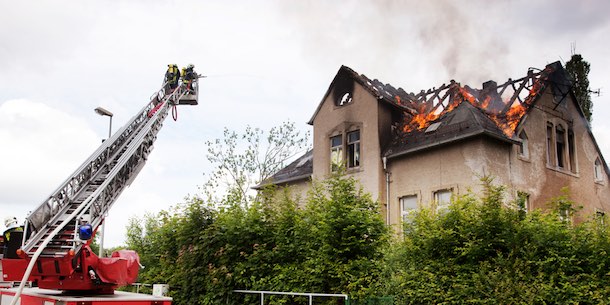When the Johnsons’ house caught fire — the second time that day — the entire neighborhood came to watch. The disquieting mass of black smoke that billowed from the top floor of the Tudor, with its gable roofs and timber framing, was a bleak beacon that summoned the residents of Birchwood Village to gather together. And gather together they did — a stray few at first, folks already on their constitutionals, after supper, around 7, on such an otherwise pleasant mid-April evening, curious as to what that rolling dark cloud was. Then, as word spread, and the suffocating dense smell of burnt, just burnt, blanketed the area, more and more people arrived, and more after that, and even more, and more still, until eventually nearly everyone had emptied from their homes, with screen doors smacking, light sweaters thrown on, stumbling into flip-flops and sneakers, jumping onto bikes, pushing baby strollers, pulling at yipping dogs on leashes, excited chattering, nervous murmuring. All of Birchwood Village turned out that day when the Johnsons’ house caught fire a second time.
The first question among the burgeoning group of looky-loos was whose house was it? because surely it couldn’t be the Johnsons’ house. Not again. Those poor Johnsons. Their house had already caught fire earlier in the afternoon, witnessed then by only a fraction of those who were streaming toward it now — mostly stay-at-home moms, and retirees, and a scattering of others who for whatever reasons had no particular place to be in the middle of the day, 2:30-ish. Of course no one wanted it to be the Johnsons’ house, not again, those poor Johnsons, but if it wasn’t the Johnsons’ house that was on fire, whose house was it, and did that mean there was a serial arsonist on the loose burning down houses one after the next?
Fortunately, although not so much for the Johnsons — in fact, it was downright unfortunate for the Johnsons — the house on fire was indeed the Johnsons’ and twice today of all things. Those poor, poor Johnsons. On the bright side, if there was one, as soon as the residents began to gather together, so too did the first responders — or would they be considered second responders under the circumstances, this being their second trip to the Johnsons’ house within the span of only hours? Three shiny red fire trucks from the nearby districts of St. Martins, Chester Hills, and Limerock burst onto the scene, along with a Metro ambulance, a Metro police cruiser, and police cruisers from the other nearby districts of Ridgeland and Rollingway. There was even some guy who came screeching up in a Jeep, narrowly avoiding the Thingstons’ empty recycling bin that they were always dilatory in retrieving from the curb, outfitted in what looked to be his very own firefighting gear — no doubt a volunteer who had heard the call on his scanner.
It quickly became quite an event, with the jumbled pattern of asynchronous flashing lights from the various vehicles, and the bustle and ruckus as the first responders — or were they second responders? — darted to their designated positions. Two burly firefighters lumbered down from the Limerock fire truck and went to work unspooling the thick yellow hose and connecting it to the hydrant that stood at attention at the intersection of Swan and Forest. That hydrant had been there for as long as anyone could remember, although no one could remember when it had been used last — most considered it merely decorative, akin to the flower beds at the four corners that sprouted blooms of fuchsia and deep purple — and yet here that hydrant was used twice today. A couple other firefighters grabbed the other end of the hose and ran off with it in the opposite direction, making a beeline for the Johnsons’ house. When the hose inflated, which Mary Ellen Pomeroy later complained had caused an alarming drop in the water pressure to her kitchen sink while she was doing the dishes, one especially brave firefighter, slight of build, wrestled with the nozzle to direct the powerful jet of water in the general vicinity of the volatile amalgam of bright orange and yellow and crimson flames that lapped away at the second story.
The neighbors stood in awe, mouths agape, hands on hips or chins, while the mission to save what remained of the Johnsons’ house proceeded with military precision. Some debated what part of the house that was, consumed by the blaze, wondering aloud if maybe it was the master bedroom as many of these older homes, and the Johnsons’ house was probably built in the ’40s like most of the other homes on the block, had their masters on the top floor. Others opined that it could have been the study for shelves crammed full of musty dusty books would most assuredly ignite as instantaneously as this fire had. And others questioned if the Johnson children were still young enough for a playroom and, if so, was that where it was — those poor Johnson children losing their playroom in such a jarring manner. Since none of those involved in the discussion had actually ever stepped inside the Johnsons’ house, the issue as to the specific location of the inferno therein, while intensely debated, ultimately remained unresolved.
Another, and not unrelated, topic of conversation, and one that should have properly been the primary concern, was where were the Johnsons anyway? There had been vague speculations but, as with the previous topic, no definitive conclusion. Ted Robinson, a DJ for the local public radio station who hosted a program of blues standards during the overnight shift from 11 to 3, postulated that Mr. Johnson, an attorney for a prominent personal injury firm who typically pulled late hours, was at work. Ted then tried to lighten the mood, as he was apt to do on his radio program according to those insomniacs and blues standards aficionados in the crowd who tuned in from time to time, by cracking a joke based on the premise that Mr. Johnson, like a lot of the lawyers in town, had his office in the tower on Market Street that many thought resembled a penis. But Mrs. Shuttleford, who did not suffer fools gladly and who, at age 88, prided in cutting her grass herself, and with a push mower, stopped Ted before he could reach the punch line, scolding that such bawdy humor was wholly inappropriate, with the whereabouts of the Johnsons largely unknown.
It was around then when one of the police officers, the police officer from Ridgeland who was contracted out by Birchwood Village to patrol the streets in his off-hours to curtail any shenanigans and suspicious activity and, of particular import, to make certain that members of the Wheelmen (and Wheelwomen) Cycling Club obeyed the traffic laws when they pedaled through the neighborhood on their weekend group rides, overhearing the conversation, interjected that everyone in the Johnson household was accounted for, having all absconded to Mrs. Johnson’s mother’s house in Butchertown after the first fire and not returned. With that bit of relief, Ted tried to retell his joke about the “irony” of lawyers working in an office tower that resembled a penis, but the moment had passed, and he gave it only a half-hearted attempt before sulking away to ready for his overnight shift — whatever that entailed, perhaps putting on a fresh shirt — playing blues standards from 11 to 3 on the local public radio station.
After 45 minutes, give or take as no one was minding the time, too engrossed by the hubbub, the firefighters appeared to have the fire well under control, save for some stray, dangling ribbons of soot curling and dribbling from the second-floor windows. The flames of bright orange and yellow and crimson had been extinguished and in their stead a soggy, dripping mess. Nonetheless, people continued to drop by, to have a peek, to see what was what, lingering about in front of the Johnsons’ house and on the lawns of the houses across from it. Young Billy Milner, an enterprising 10-year-old who already had his summer buzz cut even though school did not let out for the summer for another month, took advantage of the situation, as he lived in one of those houses across from the Johnsons’ where people were lingering, and set up a lemonade stand fashioned from a stack of TV trays he carried from his father’s rec room in the basement. Young Billy charged 50 cents for a Dixie cup of store-bought lemonade he precariously poured with two hands from a plastic gallon jug he snuck from the fridge. Mrs. Patterson, who lived next door to the Milners in a quaint Cape Code she shared with her ill-tempered — although some referred to the animal as simply plain hateful — Maltese, Koukla, mingled about with a platter of homemade chocolate chip cookies and a straw basket of her grandchildren’s leftover Easter candy, mainly loose jelly beans and malted milk eggs, which she offered gratis, and those were snatched up and gobbled down with haste.
Before long this gathering of concerned — if not concerned, certainly inquisitive — citizens escalated into a full-blown block party, even while the Johnsons’ house barely smoldered and the two burly firefighters had begun to respool their thick yellow hose and pack it away with the rest of their equipment. Beach chairs and blankets had been set about, people lounged and relaxed. A group of renters who shared a two-bedroom suite at the Stonemill Apartments at the end of Blanchard next to the park, with their shoulder-length hair and bushy beards and, observed Mrs. Shuttleford, “all sorts of tattoos — just everywhere,” showed up with their guitars and bongo drums and tambourines and staged an impromptu concert, singing songs no one had heard of, but no one seemed to mind either. Even Mrs. Shuttleford tapped her feet in rhythm. The starting lineup of the St. Martins Dragons, the reigning regional Little League champs, returning from practice at the field where the old Sears used to be, played games of run-down and pepper next to the Baxters’ white ranch that sat on the corner. A circle of college students, on a break from studying for finals, kicked around a hacky sack, and Old Man Williams brought out his bocce balls, and he never brought out his bocce balls before Memorial Day.
This kept on as the sun set and night approached. Gasoline generators were revved and throttled to power industrial-sized flood lamps so the firefighters could check for hot spots and structural instability. Cast in that harsh, artificial light, with shadows angled in jagged shapes, the Johnsons’ house was a shell of what it had been, a wooden cut-out backdrop from a movie set. One of the firefighters made his way into the attic and started cutting away at the roof with a chainsaw to ventilate the inside. The low dim humming of that chainsaw melted into white noise as attention to the Johnsons’ house waned. People had split and divided into groups and clusters to discuss sports and politics and current events, rumors and innuendo, to exchange business cards and recipes and the names and phone numbers of babysitters and handymen, to generally chuckle and guffaw and shoot the breeze.
Chip Caruthers, cradling his sleeping infant son, Chip Junior, tightly against his chest as he rocked slightly back and forth, to the requisite oohs and aahs of those he approached, including the police officer from Chester Hills, a stern individual who offered an uncharacteristic albeit heartfelt coochie-coochie-coo to the boy, remarked how this was better attended than the Fourth of July cookout held each summer on the grounds of the Birchwood Village Church. Everyone laughed and agreed because it was one of those funny comments that was also true. Then Tom Canari, the self-proclaimed “high roller” who would boast of frequenting the casino across the river for private games of baccarat cordoned off from the general public by a velour rope, added how “we should do this more often,” which was met with a very awkward and stilted silence until he clarified, “without the two fires to the Johnsons’ house of course.” Folks agreed, but the response was still tepid as no one much cared for Tom Canari as he was rather full of himself.
By about 10, the police cruisers and the ambulance and all but one of the fire trucks — the firefighters from Limerock lagging behind to keep an eye out for hot spots — had gone, as had most of the people. It was, after all, a weeknight. There were a few stragglers, those who for whatever reasons had no particular place to be and did not need to wake up early in the morning. A 20-something couple no one could place kissed passionately beneath the weeping willow in Mrs. Patterson’s yard, much to the consternation of her hateful Maltese, Koukla, who barked at them incessantly from inside the house through the living room window until Mrs. Patterson drew the shades. Some people planned to meet up sometime for lunch, or for cards, or just promised to “see ya around.” There was talk of bringing casseroles and salad and a cold-cut platter from the Kroger deli to the Johnsons, with an assortment of desserts — pies and cobblers and seasonal berries — and maybe some clothes and toys for their children as soon as it was ascertained how old their children were. In any event, all promised to check in on the Johnsons since that was the neighborly thing to do.
And at the end, everyone returned to their homes, and retreated silently inside, to do whatever it was they normally did when there wasn’t such a commotion, and Birchwood Village settled down once more, and everything went back to how it had been, except for the Johnsons, those poor Johnsons, the time their house caught fire, the second time that day.
Become a Saturday Evening Post member and enjoy unlimited access. Subscribe now




Comments
How sad.